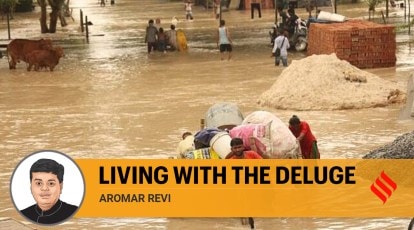July 20, 2023
Building Resilient Cities in the face Of Climate Change

Source: The Indian Express
Introduction:
- Cities in India are grappling with the devastating consequences of climate change, as extreme weather events like floods, heatwaves, and water scarcity become more frequent and intense.
- With the effects of global warming exacerbating these challenges, it is imperative that cities take proactive measures to adapt and prepare for the future.
- Traditional, isolated responses to the climate crisis are insufficient. Instead, comprehensive strategies that address urban vulnerabilities and integrate various sectors are needed to protect lives, limit economic losses, and enhance resilience.
Strengthening Infrastructure for Effective Drainage:
- Ensuring efficient stormwater drainage systems is crucial for mitigating the impact of flooding in cities. Regular maintenance and clearing of drains, tanks, and lakes are essential to prevent blockages caused by debris, silt, and encroachments.
- By implementing a year-round planning approach and allocating sufficient financial and human resources, urban civic bodies can enhance the resilience of drainage systems, mitigate flooding, and promote groundwater recharge and surface storage.
Integrated Water Management:
- The integration of drainage, water supply, and wastewater systems is a medium-term solution that can address the challenges posed by intense rainfall.
- By storing rainwater during periods of heavy precipitation and treating and recycling wastewater during drier times, cities can improve overall water management and reduce waterborne diseases.
- However, it is crucial that infrastructure development keeps pace with changing rainfall patterns and urban expansion to effectively manage water resources.
Infrastructure Planning and Coordination:
- To prevent local flooding, it is necessary to improve the coordination between infrastructure planning and road development.
- Existing roads should be repaired and built in a way that considers drainage systems, preventing waterlogging during heavy rains.
- Coordination between concerned agencies, as demonstrated in many cities, is essential for effective infrastructure planning and the prevention of traffic bottlenecks caused by disruptions to drainage systems.
Embracing Nature-Based Solutions:
- Preserving and restoring natural ecosystems within cities, such as urban forests, wetlands, rivers, and lakes, is critical for climate change adaptation.
- These green and blue infrastructure elements provide multiple benefits, including flood regulation, groundwater recharge, and heatwave mitigation.
- Following the example of “sponge cities” in China, Indian cities should focus on incorporating nature-based solutions into their urban planning strategies.
Reducing Vulnerability and Enhancing Community Resilience:
- Mapping flood-prone areas using high-resolution satellite and topographical data is a valuable tool for identifying vulnerable populations.
- Efforts should be made to address the challenges faced by those living in low-lying areas, along riverbanks, and on unstable slopes.
- Enhancing community-based resilience through improved evacuation plans, early warning systems, and reliable infrastructure services is crucial to minimize the loss of lives and livelihoods.
The Conclusion:
- As climate change impacts escalate, it is imperative that Indian cities adopt a holistic and proactive approach to building resilience.
- By prioritizing basic environmental services like water, sanitation, drainage, and waste management, cities can reduce vulnerabilities, improve public health, and create more livable spaces.
- It is time to acknowledge the reality of a warming world and take collective action to protect and prepare our cities for the challenges that lie ahead.
Llama 3:
April 24, 2024
Global Plastic Treaty:
April 24, 2024
THE WORLD TIGER DAY CELEBRATION
August 5, 2022
A new Sample data for Polity & Governance
July 27, 2022
Sample data for Polity & Governance
July 27, 2022
